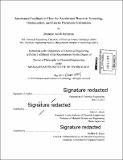Automated feedback in flow for accelerated reaction screening, optimization, and kinetic parameter estimation
Author(s)
Reizman, Brandon Jacob
DownloadFull printable version (30.54Mb)
Other Contributors
Massachusetts Institute of Technology. Department of Chemical Engineering.
Advisor
Klavs F. Jensen.
Terms of use
Metadata
Show full item recordAbstract
With the cost to discover and develop a drug now estimated to exceed $2 billion, the pharmaceutical industry is in search of innovative and cost-effective ways to reduce process footprint, minimize lead times, and accelerate scale-up. One path to achieving these goals is in the adoption of continuous processing. Among the many advantages offered by the use of continuous flow systems is the ease of integration of automation and online analytics for realtime monitoring of reactions. The further incorporation of feedback into automated systems invents an even greater possibility: the use of algorithms to intelligently manipulate different continuous variables-for instance temperature, time, and concentration-until an optimal synthesis is achieved. This thesis opens by reviewing the most recent applications of feedback optimization in flow. The same methodology is then applied to the estimation of reaction kinetics in a series-parallel SNAr reaction network. Unfortunately, the most challenging aspect of reaction development tends not to necessarily be the continuous variables, but rather the enumerate combinations of discrete variables-e.g. catalysts, ligands, and solvents-that, when paired with the continuous variables, give rise to changes in the reaction mechanism or kinetics. To address this problem, this thesis introduces a more general approach to reaction optimization with the construction of an automated segmented flow system, wherein reactants are confined to sub-20 [mu]L slugs flowing through a heated Teflon tube microreactor and analyzed online by LC/MS. The system allows for manipulation of both discrete and continuous variables, making it possible to simultaneously screen reagents while optimizing the reaction. A sequential adaptive response surface methodology for optimizing both discrete and continuous variables is presented. The algorithm employs optimal design of experiments in feedback to greatly accelerate convergence of the mixed integer nonlinear programming (MINLP). Examples of real-time simultaneous screening and optimization are explored, including optimal solvent selection in a selective alkylation reaction and optimal palladacycle-ligand precatalyst selection for Suzuki-Miyaura cross-coupling reactions. We conclude by showing how the automated system can be utilized to gain further understanding of reaction mechanisms and kinetics and by demonstrating that the optimal results can be scaled to larger chemical syntheses.
Description
Thesis: Ph. D., Massachusetts Institute of Technology, Department of Chemical Engineering, 2015. Cataloged from PDF version of thesis. Includes bibliographical references (pages 164-184).
Date issued
2015Department
Massachusetts Institute of Technology. Department of Chemical EngineeringPublisher
Massachusetts Institute of Technology
Keywords
Chemical Engineering.